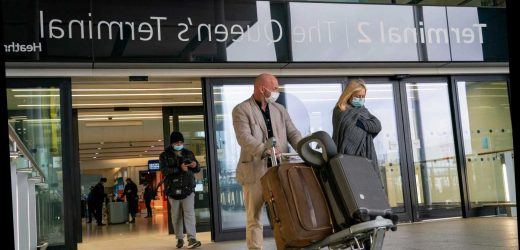BRITS could face a £1,600 bill per person when returning to the UK if the new hotel quarantine scheme is introduced.
The government is currently in discussions with hotels including IHG Group, which owns Holiday Inns, to enforce a mandatory 10-day self-isolation period at the hotels.
Home Secretary Priti Patel and Health Secretary Matt Hancock are backing the restrictions which would mean all arrivals are forced to quarantine at the approved accommodation instead of at their own homes.
The Prime Minister, when asked about the new restrictions, said: "We are definitely looking at that.
"But the UK does already have one of the tightest regimes at the border already."
He added: "That idea of hotels is certainly one thing we are actively working on. We need a solution that gives us the maximum possible protection."
The new restrictions are similar to Australia and New Zealand, where a two-week quarantine period can cost as much as £1,600 per person – making it a pricey addition to a family holiday.
According to the Telegraph, a 14-day quarantine hotel costs £1,692 in Australia, £1,630 in New Zealand and £642 in Thailand.
How do quarantine hotels work?
A quarantine hotel is a dedicated facility used to temporarily accommodate arriving travellers, while keeping them totally separate and isolated from the wider public.
Checked luggage is transferred separately to the specially designated accommodation and, as long as they don't have any symptoms, travellers are also transferred to a hotel or other designated quarantine facility.
Boris Johnson is reportedly considering forcing all travellers to quarantine in airport hotels for ten days to prevent new coronavirus strains harming Britain's vaccination programme.
As in New Zealand and Australia, travellers would have to pay for their own accommodation costs.
Officials are confident that they can find enough capacity to accommodate all arrivals – which is currently around 10,000 a day.
A new “selfie-isolation” rule is likely, which will require those in quarantine to send a daily picture proving they are staying indoors.
Transport Secretary Grant Shapps has argued that the new restrictions should only apply to passengers arriving from countries with known new strains of coronavirus which would include Brazil and South Africa.
If introduced, the new measures would join the current mandatory negative coronavirus tet required from all arrivals, taken no more than 72 hours before travel.
All travel corridors have also been scrapped meaning all UK arrivals must currently quarantine for 10 days but this can be done at home and can be reduced to five days with another negative coronavirus test.
Travel expert Paul Charles, founder of the PC Agency, warned that the UK could be cut off from the rest of the world for a year if an end date to the new measures.
He made the dire warning as he called on Downing Street to provide an end date to the hotel plan if it's approved at a meeting between ministers tomorrow.
He told Sun Online Travel: “We need the government to put an end date on these measures – what is the exit plan and roadmap for coming out."
“But we need to see an exit plan, otherwise people wouldn’t have confidence to book summer holidays and there is a danger these policies would stay in place for several months.
“But the fear and concern is these would last longer than March.
“That's why we need an end date and to know what the criteria is for ending the scheme, otherwise Britain could be disconnected from the world for a year or more, which is really what's happening in Australia.”
The UK recorded 30,004 new cases of COVID-19 on Sunday, taking total cases to 3.65m.
The death toll is also approaching 100,000 after 601 new deaths were confirmed yesterday.
However, the UK's vaccine programme saw a record high with 491,970 receiving their first dose yesterday, taking the overall number of people in Britain to have had their first dose to 6.35 million.
Source: Read Full Article




